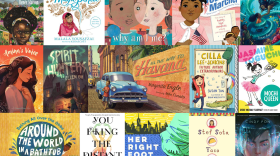A couple of months ago, I decided that I would take my five-year-old daughter with me to the local Women’s March. Since my explanations were not as clear as I wanted, I searched for a children’s book to help me explain the 2016 Women’s March to her.
Unfortunately, the only book I found was a shallow story of girl with a pink hat, ignoring most of the political aspects of the march. And it was written by a man.
Now, the author's probably a nice guy. Maybe he marched with his wife and daughter and was so moved by what he experienced that he felt there should be a book about it, and thought, “I’m a writer! I can write the book about this.” And so he did.
But while he might have had good intentions, his actions have a jarring impact. The purpose of the Women’s March was to have women’s voices be heard, to amplify women’s viewpoints. Having a man publish the first children’s book about it not only means that he's speaking for women, but he's also eliminated that possibility for a woman writer. Now, no woman can create that first book. Nor can she reap the publicity benefits and the publishing power that doing so entails. His action of creating this book is the antithesis of his subject matter.
Because I'm a voice for diversity, white writers often ask me if they can write outside their race. “Imagining other viewpoints is why I'm a writer,” they tell me. “Why can’t I write about someone that doesn’t look like me?”
And at this, I have to tell them they're asking the wrong question. Because, of course, a writer can write about whomever he or she wishes.
When it comes to writing outside one's race, the question has never been, "Can I write this?" No, the real question is, "Should I write this?"
When it comes to writing outside one's race, the question has never been, “Can I write this?” No, the real question is, “Should I write this?”
Because, sure, a man can write about the Women’s March. He’s already done it. But should he have?
If a man sincerely believes in all that the Women’s March was and is trying to accomplish, he would be truer to those beliefs by allowing a woman to write the first book about it. Likewise, if writers believe in racial equity in our literature community, they would be truer to those beliefs by realizing that there are some stories that are better left for others to tell.
At the Women’s March, I was struck by the signs everyone carried. Some were witty, some were heartbreaking and some were angry, but all seemed deeply felt. If that sincerity is genuine, we need to bring it past the marches and the decorative pins, and into all aspects of our lives — especially when we choose what to write and what not to write.
Grace Lin has written and illustrated more than a dozen children’s books, including the National Book Award finalist, "When the Sea Turned to Silver." She lives in Florence, Massachusetts.






